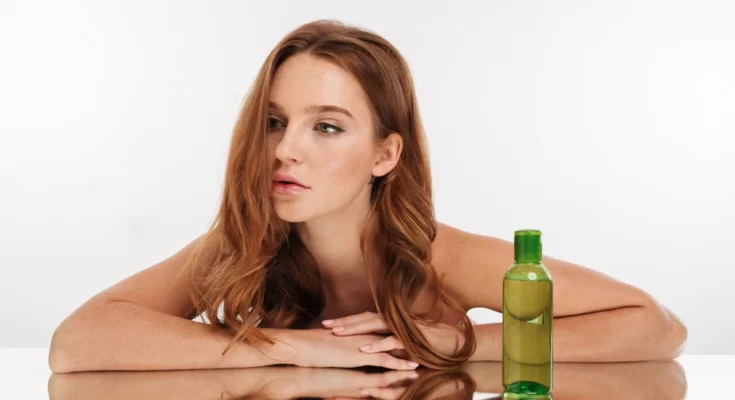Over the years, we have witnessed a significant evolution in hair care and styling, which includes new products and methods emerging to help people attain their desired looks. Do you want to know “what is a toner for hair?” To transform and enhance the appearance of hair, this product called Hair Toner holds a special place. Toners are crucial in achieving the ideal hair color because they can add vibrancy and correct unwanted undertones. Keep reading this article to explore hair toner, like its function, varieties, application techniques, and the numerous advantages it provides to those who aim for flawless hair. In this blog, we will learn about hair toners, different types of hair toners, and their applications.
Also Read: Zincovit tablets for hair growth- Good or Bad?
What Is A Toner For Hair?
A hair toner is like a magical liquid for your hair. It’s used to make your hair color look how you want it to. Sometimes, after coloring your hair, it might turn a bit too yellow or brassy, and that’s where the hair toner comes in. It helps to fix those unwanted colors and make your hair look more natural and beautiful. Just think of it as a special potion that helps your hair color shine perfectly!
How To Use A Hair Toner?
Hair toner is mainly used to transform the undertone of hair color, particularly after lightening or coloring. It is used to combat the undesired brassy or yellow tones that may appear due to bleaching or hair coloring. Hair toners are used to produce a hair color that is more balanced, natural, and aesthetically pleasing.
Also Read: Chemotherapy: Why is there hair loss?
Why Use A Hair Toner?
The main objective of hair toner is to balance and neutralize unfavorable undertones that could emerge during the coloring procedure. The underlying hue becomes visible, which produces warm, brassy or yellowish tones because of bleaching and lightening. These undesired undertones may provide an uneven or unnatural appearance that obstructs attaining the desired hair color. The color pigments in these hair toners balance out these unwanted undertones, bringing the hair closer to the desired color or shade.
What Are The Different Types Of Hair Toners?
For every specific hair coloring goal, there are various types of Hair Toners:
-
Violet/silver Toner: This toner covers up brassy or yellow tones in gray or blonde hair. The yellow color is counteracted by violet pigments, giving the outermost layer of hair a cooler and more shy look.
-
Blue Toner: Blue toners alleviate the brassy or orange overtones, similar to violet toners, especially in darker hair colors.
-
Green Toner: Green toner is generally used to fix the hair’s excessive red or coppery tones.
-
Pastel Toner: Pastel toner dilutes the intensity of hair color, and as a result, it can produce a subtle, soft shade to your hair.
-
Clear Toner: Clear toner is primarily used to add shine and gloss to dry hair without toner altering the color, as these toners do not contain any pigment, or you can say it is a pigment-free hair toner.
Also Read: Have You Tried These 2 Best shampoo for hair growth?
What Is The Application Of Hair Toner?
Using hair toner is like giving your hair a mini makeover! Here’s how you apply it:
A Delicate Process: To achieve the desired outcomes, the application of hair toner needs precision and careful consideration:
Preparation: Shampooing and towel drying the hair before applying a toner is essential. This will make sure that the toner coats the hair strands uniformly.
Mixing: Toners are mainly mixed with developers to activate the color pigments. The ratio of the mixture depends on the particular toner and the level of color correction needed.
Application: With the help of a brush, the mixture made up of the toners and developers should be applied evenly to the hair. It is recommended to work quickly and efficiently to avoid uneven color distribution.
Processing Time: The manufacturer or hairstylist will specify how long the toner should be applied to the hair. It is crucial to keep an eye on the hair throughout this period to prevent over-processing.
Rinsing and conditioning: The toner should be rinsed thoroughly after processing. After rinsing the toner, the application of conditioner is recommended to maintain the health and softness of the hair.
Post-Treatment Care: Using color-safe and sulfate-free products is advised to enhance the toner’s effects. Also, regular touch-ups may be required as toner fades as time passes.
Also Read: The 10 Best Shampoos For Hair Loss: 2023 Picks
What are the benefits of using hair toner?
The application of hair toners provides numerous benefits that contribute to enhancing hair aesthetics:
-
Color Correction: Applying a hair toner will show instant results if you want to fix your hair’s undesirable undertones. It will create a more natural and harmonious hair color.
-
Vibrancy and Shine: The Application of hair toner will give you a more vibrant and glossy look, enhancing your overall hair appearance.
-
Customization: The most crucial feature of hair toner is that it is flexible, and you can get personalized color adjustments, which enables individuals to achieve the desired hair shades.
-
Reduced Brassiness: Hair toner can also minimize brassiness and maintain a more relaxed tone for people with blonde or gray hair.
-
Versatility: As we can witness, a variety of toners are available in the market, giving it versatility and enabling individuals to experiment with different shades and effects.
-
Temporary Solution: Toners offer a quick color solution, allowing individuals to change their hair color without a long-term commitment.
-
Considerations and Limitations: Every coin has two sides, so having remarkable benefits, it’s important to take note of some of the limitations of hair toner:
-
Temporary Effects: Due to washing and outdoor exposure, toner effects gradually deteriorate, demanding routine maintenance.
-
Hair Health: Frequent Application of hair toner can hurt hair health, which may cause dryness or damage to your hair. To lessen these consequences, proper hair care is essential.
-
Professional Expertise: To achieve the desired results may require professional hairstylists, especially for complex color corrections.
-
Color Variability: Hair type, condition, and existing color are some factors that can alter the effects of toner application.
Also Read: Best Hair Straightening Cream & Product of 2023
Conclusion
I think you got your answer to “what is a toner for hair?” Hair toner is a transforming hair care solution that can fix, enhance, and raise hair aesthetics. Toners provide a diverse solution for people who want to attain their preferred hair colors by neutralizing undesirable undertones and boosting shine. Understanding the many types of toners, their application techniques, and the benefits they give is essential for those wishing to maximize the potential of this fantastic hair care item. As the world of hair care evolves, hair toners remain a timeless and crucial component of the journey to ideal hair color.
Though these are primarily helpful for toning, it will be best to focus on getting the right shades for the hair and not overdo the serum, as sometimes it can result in drying out of the hair and turning into different colors altogether.
Frequently Asked Questions
Is A toner the same as a hair dye?
While toner is used to color the hair, toner can provide shine.
Does toner lighten hair?
Toners can work by depositing colors on the lightening hair brighter than toners.
What is toner for hair?
Hair toners are the best solutions that colorists can use to make hair lighter and brighter.
Is toner bad for your hair?
Toners can have a beautiful hair finish and have terrible effects.
What are the hair color for cool skin tone?
Extra Light Ash Blonde, champagne Blonde, and Medium Ash Blonde Bombshell are the hair color for cool skin tone.
What are the toner for brown hair?
You can use Wella Professionals Care Color Fresh Semi-Permanent Mask for better results.
What is the best toner for blonde hair?
The Silver Shampoo can be used if you have blonde hair.
What is the best toner for orange hair?
Blue toner you can use.
Source link



